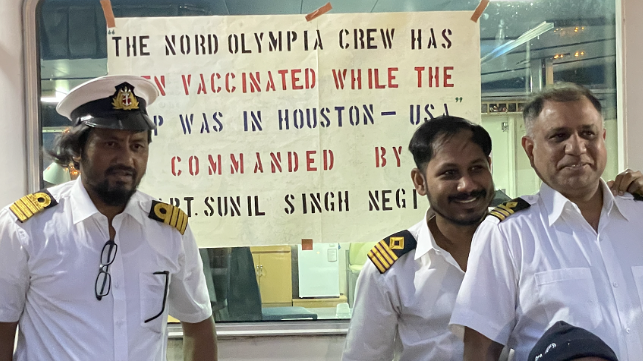Houston Seafarers Center Vaccinates 8,000 Visiting Crewmembers

Following more than a year of random pandemic challenges, the synergy is clear among U.S. seafarers’ welfare groups, logistic teams, global advisors and others who simply care. The coordinated effort to vaccinate those on ships is making a personal difference to thousands of seafarers.
Seafarers are exposed to pilots, inspectors, port workers and others ashore who may be infected, and they need to be safe. Already in the summer of 2020, maritime community professionals including unions, seafarer centers, the International Transport Workers Federation and others began seeking ways for seafarers to be recognized as critical workers in the supply chain. COVID-created problems caused government agencies and health care providers to consider allowing vaccines for foreign workers visiting U.S. ports as well.
“When seafarers come down with COVID, their ship’s [cargo] stops moving,” said Dana Blume, Executive Director of the Houston International Seafarers’ Center. “When we lose the seafarers, we lose our normal life. When there is a gas or grocery shortage it may be because a ship is quarantined off the coast of Chile or somewhere.”
Since May, seafarer center staff across Texas in ports such as Corpus Christi, Houston, Port Arthur, and Port Comfort escorted vaccine providers to meet seafarers at ship’s gangways for vaccinations at no cost to the seafarer, according to Capt. Anuj Chopra, Houston International Seafarer Center board member. Hospital workers, local pharmacists, and county and state health departments participated. However, the State’s contribution became unsustainable.
“It is a daunting task, a huge undertaking to get a seafarer vaccinated,” said Blume. “You need to explain and coordinate with captains and agents and providers. It’s time. It’s money. It’s our mission.”
Blume began working with government offices, but quickly learned seafarers competed with a number of other groups for vaccination priority. She continued networking that led to Tona Trondsen, founder and CEO of Workplace Safety Screenings. Blume asked about vaccinating seafarers in the port of Houston. By happy coincidence, Trondsen’s father was a seafarer, so she was motivated to help.
“I have always had a love for seafarers,” Trondsen said. “This opportunity is a labor of love.”
Workplace works with the complex scheduling natural to shipping. Vaccinating may mean meeting a ship that arrives at 3 a.m. That is not a problem.
A nurse and technician serve 10 to 19 vessels a day in the Houston port. Though the vaccines themselves are without cost to the seafarers, the company does charge a nominal fee of $450 for administrative services which include documenting all data, completing Texas database records and providing seafarers with vaccination cards needed to get off ship in ports, return home at the end of their contracts and eliminate barriers to continued employment.
“We started and it just cascaded,” said Chopra, CEO and co-founder of ESGplus LLC.
More than 8,000 seafarers have been vaccinated since coordinate efforts began in Port Houston earlier this spring. Its all thanks to the united efforts of individuals who serve not for profit, but because it is their mission.
“The Houston International Seafarers Center could have stepped away from the vaccine undertaking. It is complicated and takes many hours of emails, phone calls and perseverance,” said Blume. “But it fits our mission statement perfectly. It keeps seafarers knowing we are still open and here for them. That’s who we are.”
Successful experiences are shared with other ports around the U.S. on the internet. The word has spread to shipowners and operators in Europe and Asia whose ships are calling on Houston.
“As we shared our experiences, the North American Maritime Ministry Association (NAMMA) became a great warehouse of information that is updated daily,” said Chopra. “It is a transparent resource available to foreign shipping company agents, seafarer centers and all who can benefit.”
States and stakeholders are realizing that seafarers are imperative to supply chains and the care of seafarers makes the supply chain stronger. How those who benefit respond financially to non-profit seafarer centers is strictly voluntary. Donations are graciously welcomed but not mandatory.
“My mission is to avoid price gouging,” said Capt. Mahesh Bedre, a master mariner and Fellow of the Institute of Chartered Ship Brokers (London), who works with global ship owners. “I know the owners. If owners want to give any donation [to the seafarers’ center], it is voluntary.”

that matters most
Get the latest maritime news delivered to your inbox daily.
Dots continue connecting through the NAMMA resources. “I have no words to thank NAMMA,” Bedre said. “At the end of the night, I feel so blessed. I am giving back something to the fraternity of seafarers.”
Susan Huppert is a writer for The MARE Report, the news magazine for the North American Maritime Ministry Association. With members in more than 50 ports around North America, NAMMA’s mission is to support those in maritime ministry with professional development, fellowship, and advocacy.
The opinions expressed herein are the author's and not necessarily those of The Maritime Executive.
